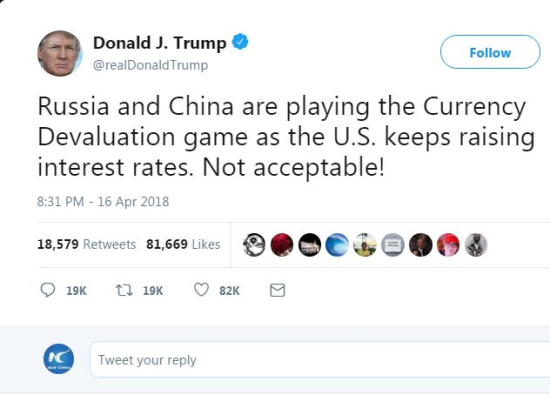 A tweet by U.S. President Donald Trump blaming China and Russia for currency manipulation was quickly contested on Monday. Trump tweeted early Monday that "Russia and China are playing the Currency Devaluation game as the U.S. keeps raising interest rates. Not acceptable!" His words came three days after the U.S. Treasury Department's semiannual report to Congress on Friday that China and five other major U.S. trading partners placed under monitoring-Germany, Japan, South Korea, Switzerland and India - were not manipulating their currencies. "This tweet reflects a misunderstanding of currency issues. China's currency has appreciated significantly against the U.S. dollar since Trump took office, which should in principle make U.S. exports more competitive in the Chinese market," said Eswar Prasad, a senior fellow at the Brookings Institution and former International Monetary Fund China division chief. Prasad told China Daily that there is little evidence that China is intervening substantially in foreign exchange markets to prevent its currency from appreciating further against the dollar. "Invoking currency devaluation in the context of the escalating U.S. trade dispute with China is not consistent at this stage with the facts on the ground," said Prasad, author of the recent books Gaining Currency: The Rise of the Renminbi and Dollar Trap: How the U.S. Dollar Tightened Its Grip on Global Finance. Nicholas Burns, a former U.S. undersecretary of state for political affairs, described Trump's words as "the real danger and risk of Twitter diplomacy by the president when he fires off the tweet without having talked to his advisers and without having confirmed the facts". "The Treasury report last week did not brand China a currency manipulator. Now the president does. So it makes us look a little bit unstable and unsteady," he said on CNBC on Monday. He said any president's words are "sacrosanct" and have to have credibility. "This reduces our president's, our country's, credibility when he says things that are not accurate," said Burns, now a professor at Harvard's Kennedy School. Trump had repeatedly accused China of currency manipulation during his 2016 presidential campaign. But three reports issued by the Treasury under Trump did not find that China had manipulated its currency. On the contrary, the U.S. dollar has weakened substantially in the past year against most currencies, including the renminbi. The yuan has gained about 10 percent against the U.S. dollar in the past 12 months and climbed in March to its strongest level since August 2015, according to Bloomberg News. Yi Gang, governor of the People's Bank of China, the central bank, said on April 11 that China has no intention of manipulating its exchange rate to try to boost trade. |
Powered by Discuz! X3.4
© 2001-2013 Comsenz Inc.